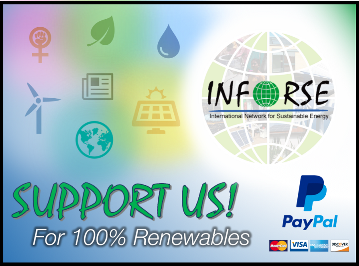|
|
|
|
|
|
|
|
|
|
|
|
|
|
|
|
|
|
|
|
|
| Follow Us: |
| INFORSEs submission to UNFCCC Global Stock Take (GST) - 28 February 2022 | |
| From INFORSE, we call for including local sustainable solutions in the Global Stock Take, which are not adequately included in many of the NDCs. | |
|
From INFORSE, we see the UNFCCC Global Stocktake (GST) as an important process to identify and close the gaps in national climate plans to meet the goals of the Paris Agreement, including pursuing efforts to limit global warming to 1.5 °C. Together the current nationally determined Contributions (NDCs) to the Paris Agreement, fall short of meeting the Paris Agreements goals, the temperature goal as well as the finance goal. Thus, it is important that the GST is used as a vehicle to identify additional actions that can increase the ambitions and close these glaring gaps in meeting the Paris Agreement Goals. Regarding the Paris Agreement temperature goal, many of the solutions that we have identified, are not adequately included in many of the NDCs, and we urge that for all countries, the GST review how these solutions contribute to reduce greenhouse gas (GHG) emissions. The missing solutions are generally local solutions that can contribute to reduce emissions from fossil fuels and from overuse of biomass. These includes: • Improved cook stoves that can reduce emissions by a factor 2-3 or more compared with traditional three stone fireplaces, metal charcoal stoves, chulhas etc. in households, institutions, restaurants etc. • Small household biogas plants that can replace traditional stoves and fossil fuels for cooking, and with management to minimise methane emissions are important climate solutions • Super-efficient electric “e-cookers” that can cook with around one tenth of the energy needed for traditional fires. In countries with a mainly renewable power supply, the e- cookers can reduce cooking emissions drastically. • Fireless cooking including hayboxes/retained heat cooking and solar cooking • Energy efficient cooking-fuel production, including higher-efficient charcoal making • Energy efficient installations for small enterprises, including kilns, stoves, baking-ovens, fish-smoking ovens etc. • Local power production from renewable energy, including solar home systems, micro-hydro, and renewable mini grids. • Energy efficiency in electricity use with efficient light bulbs, other energy efficient home appliances etc. • Energy efficiency in housing with building designs that minimise energy use for heating and cooling. • Bicycles and small-scale electric mobility, including electric bicycles, electric scooters, electric three-wheelers etc. that replace fossil fuel driven transport with small impact on climate and environment. These solutions are all important as drivers to reduce emissions beyond what is possible with large-scale solutions. They also contribute to development and poverty reduction. While some of these solutions are included extensively in some NDCs, they are missing in others. Therefore, we propose that in the GST, it is reported to which extent these local solutions are used in each country, how they are included in climate plans and NDCs, and which potential they have for further reductions of emissions in each country. We have in a recent analysis shown how Kenya can turn to renewable energy in ways with large focus on the above-mentioned local solutions and with reductions of energy-related climate emissions to close to zero including ending the current overuse of biomass. This shows how important local solutions are in reaching climate targets while also helping to secure energy for development. On the following pages, we have collected examples of some of the local solutions that we propose, for reference. INFORSE is member of Climate Action Network (CAN) International, and we support the proposals of CAN, as expressed in CAN’s submission to GST, including that in the GST it is important to consider equity, social and gender justice, intergenerational justice, the protection and promotion of human rights, just transition, and environmental integrity. We also support that as part of the actions, fossil fuels must be phased-out fast, while dangerous, harmful and questionable climate solutions should be avoided such as nuclear power, geoengineering, and unsustainable biomass use. Appendix: Examples of Local Sustainable Energy Solutions for Reduction of Greenhouse Gas Emissions and Development. Read the Submission at: https://www4.unfccc.int/sites/SubmissionsStaging/Documents/202202281907---GST-INFORSE-Submission-2022-1.pdf |
|
| File: INFORSE-UNFCCC_Glo...ion_2022-2_GST.pdf | |
 | |
| Organization | |
|
INFORSE International Network for Sustainable Energy OVE |
|
| Projects | |
|
Event: UNFCCC COP26 INFORSE Side Event & Exhibition: Nov 5 2021 |
|
|
Event: UNFCCC COP28 INFORSE Side Event: Local Solutions, 100RE - Dec 8 2023 |
|
| Newsletter | |
|
Sustainable Energy News: #85 Sustainable Energy News |
|
| Contact | |
| |
INFORSE Secretariat Klosterport 4F, 1. floor DK-8000 Aarhus C Denmark Phone: +45 86 22 70 00 Twitter: INFORSE_org Facebook: INFORSE Web: inforse.org E-mail: ove@inforse.org |
